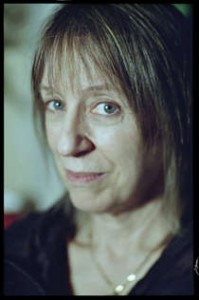"The main thing is you are your own self”

Suze Rotolo started showing up at my gigs about a decade ago, always with her husband Enzo, always waving and smiling on her way out the door.
Once, at the now-defunct Bottom Line, the club’s legendary impresario Allan Pepper pulled me aside in that inimitable way of his, and said "You know who that is, don't you?" I did not. "She’'s a very important figure in the Village scene, she's heard all the greats," he said, sotto voce. "It’s a very BIG deal that she's a fan of yours."
It wasn't until I watched Scorsese's No Direction Home that I made the connection. There she was -- the woman who'd been showing up to my gigs all these years: Suze Rotolo, the girl on the cover of Bob Dylan's Freewheelin' album.
In 2008, I received an invite from Suze’'s publisher to perform at the launch party for her book A Freewheelin' Time. I felt honored, and I wrote to ask her what role she wanted my music to play, and whether -- given the context -- she wanted me to play Dylan songs at the event.
She replied: "I always felt, from the first time I saw you hanging out with a bass player in Washington Square Park a number of years back, that you had your own voice, yet there was an alluring connection to all that other stuff that American music is made of. I bought your album and talked it up to friends, who agreed with my take: original yet recognizable and with a great band. I know you covered the “Bootleg Series [sic],” I haven't heard it and I'd like to, but the reason I thought you would be a good choice is because I like your work, your arrangements, and musicians. I have three albums of yours and think they are really fine. In other words, Dylan covers is not the point– was not why I thought of you– but I was concerned you might think so. What you have to do with me, is simple, I like music that is good and true (it isn't easy to find in the glut), no matter the genre. You are your own self and that is the bottom line, whether you are singing your own songs or interpreting 'Oh Death.' This is longer than intended, but email does wonders overcoming shyness. I’d be happy to hear what you have to say or if you want input in choosing songs. Otherwise I'm fine with Howard Fishman as is.”
Thus began an all-too-brief friendship that lasted until Suze's untimely death in February. I played the party, some time after we went together to hear Allen Toussaint at Joe’'s Pub. As I'd hoped he might, Tousaint played his cover of Dylan’s 'Mama You Been on My Mind.' "Everybody says 'Don't Think Twice' is such a great song, but I like this one better," she told me with a smile. Sometime soon after, I went to her gallery show to see her work, and we continued to talk over email until not too long ago.
My last correspondence with Suze was about the trilogy of records I put out a few months ago. As usual, she had such perceptive, and such unique things to say about my music, things that I will always treasure. She wrote about the juxtaposition of my lyrics with my music in the context of color: "Put red next to blue and the blue recedes, creating dimension: they don't blend, they give an illusion of dimension on a flat surface. So it could possibly be with your lyrics and the music: they don’t 'blend'. The words jut forward, then come the breaks and the music takes over…The main thing is you are your own self” she concluded. “Warm salutes, Suze."
This was her last email to me, and it occurs to me now that, in offering such elevated praise, she could just as easily been talking about herself. It must have been challenging, at times, to go through life known to so many as Bob Dylan’s Girlfriend. It’s probably why, until very recently, she kept such a low profile.
For those of us who knew her personally, who read her book, who felt her warmth, who knew her wicked humor and deep feeling and thinking about things, we know that she was, above all else, exactly those words that she honored me with -- her own self.
Goodbye Suze, and warm salutes. Your friend, Howard